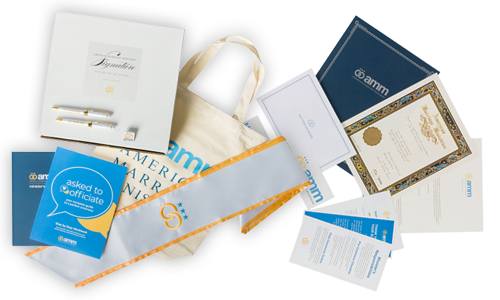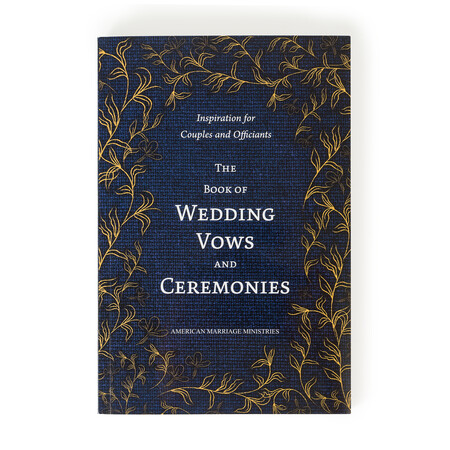How to Structure Vows Within a Wedding Ceremony
Vows are, without a doubt, the most moving part of any wedding ceremony. They are a truly special opportunity for your couple to express their love for one another before their family and friends.
So, of course, your couple should write their own vows. This is their chance to communicate exactly how they feel and what they want to promise each other. And while it is possible to fully reuse a traditional wedding script, pre-written vows and all, most couples want a more personalized ceremony.
As an officiant, you will typically have less to say in this section of the ceremony, but you still need to be ready. The flow of the ceremony is still your responsibility and you will need to be ready with cues and introductions. So don't leave everything for your couple to figure out!
Here we have broken down the 4 conventional ways to incorporate vows into a modern ceremony:
1. Repeat-After-Me
The simplest way to structure vows is a Repeat After Me format, in which the officiant reads a phrase, and the couple repeat that phrase back, individually.
'Repeat after me: I, Jebediah, promise to cherish thee…'
We do not recommend formatting vows this way, as it tends to show less emotion. With Repeat-After-Me vows, we have seen couples become more focused on repeating the words correctly, than on the words themselves. This sort of recitation is also associated with old-fashioned, priest-in-church ceremonies, and since the couple has asked you to officiate, they probably want something a little different.
2. Minister Questions
We all recognize question-based vows; these are the "I do" vows that always make the cut in Hollywood wedding scenes. The officiant asks the bride or groom to make a commitment, they respond with, "I Do" / "I Will" / "I'll Try" / etc., and process repeats for the other partner.
'Do you, Alex, promise to... ?'
'I do'
This is a great choice for a bride or groom with stage fright, or someone worried that they will be too overcome with emotion to read their own vows - or those who have always wanted to say, "I do."
3. Handwritten
This is the most popular modern option, and for good reason. In our experience, when couples write their own vows and take turns reading them, the emotion always comes through.
'Since the day I first met you, …'
When couples choose to handwrite their vows, we recommend that they write separately and share only with you to proofread, Minister. This keeps the vows as a surprise for the ceremony.
This option also requires the most work and research, since your couple must spend time in advance of the ceremony writing their vows. If you are going this route, make sure to check in with your couple a few weeks before the ceremony, to make sure they have started writing their vows, and that they know what they want to say.
4. Conversational
And finally, wedding vows can be delivered as a conversation between your couple, as they exchange lines from a shared script. This option blends two sets of vows into one, and can be thought of as a variation on Handwritten format.
For this format, make sure that the couple knows what they will say, and when they will say it. While we normally don't recommend sharing the vows before the ceremony, this format actually benefits from a practice run.
Remember, more than any other part of the ceremony, it is important that your couples' personalities and preferences be reflected in their vows. As a minister, your role is just to facilitate.
It's also okay for the ceremony to be unique! Different vow formats can be combined, and one common combo is for couples to read Handwritten vows, then throw in a couple Minister Questions to get an, "I Do," into the ceremony.
Let's take a look at the details…
REPEAT-AFTER-ME
As mentioned above, Repeat-After-Me style wedding vows are very straightforward. You, the minister, will read a series of vows, pausing line by line for the bride or groom to repeat your words. Then the process repeats for the other partner.
Traditional wedding ceremonies have fixed scripts, which include vows. Today, wedding vows are seen as an opportunity for couples to communicate their love in a more personal way, and we believe that other vow formats make this easier.
If your couple decides that they would like to use this format, we recommend that they practice speaking the vows that they will repeat during the ceremony. This will ease the pressure of the moment and make the ceremony feel like less of a memorization exercise.
MINISTER QUESTIONS
This is a great option if your couple doesn't want to speak much during their ceremony. Maybe your bride or groom is nervous about reading in front of a group, afraid they'll be too overcome with emotion, or maybe they've always imagined saying "I Do" at their wedding. Plus, questions can also be combined with other vow formats.
When vows are structured as Questions, we have found that the magic number is 12 questions (6 each). This allows for a good mix of lovey/mushy questions, with a little light-hearted humor as well, and should take just the right amount of time.
It's up to your couple, after all, these are their vows! Just be mindful not to include so many questions that the vows feel forced. In an already long ceremony, a lot of Questions can be, well, a lot. But, in a short ceremony that's focused on the vows, more than 12 questions can be okay.
And of course, we strongly encourage couples to write their own Questions to reflect their individuality. Some even choose to add a little risk, and write questions that they want their partner to agree to… always fun and interesting! Your couple should consider what they want to promise to each other, and write Questions that reflect those promises.
These questions were written by one of our couples, Tim & Ashley:
Officiant (to Tim):
Will you take Ashley to be your wife, your life partner, your best friend, your partner in crime; will you love, honor, and cherish her so long as you both shall live?
Do you vow to be patient with her when she gets stressed out, and to remind her to slow down and enjoy each day?
Do you promise only to buy organic fruits and vegetables, and only to use non-dairy ingredients in your recipes?
Do you promise to stay by Ashley's side in sickness and in health, through prosperity and decline, in good times and in bad times?
Do you vow to encourage and inspire Ashley, to listen to her and be conscious of her needs, to travel and share life's adventures with her, to strive for harmony in your marriage?
Officiant (to Ashley):
Will you take Tim to be your husband, your life partner, your best friend, your partner in crime; will you love, honor, and cherish him for as long as you both shall live?
Do you promise to cheer for the Dayton Flyers, the Cleveland Browns, and all of the other Cleveland sports teams, in spite of the odds?
Do you promise to listen to Tim's gory ICU stories and not faint?
Do you promise not to go to bed mad, and to scratch Tim's back before falling asleep?
Do you promise to stay by Tim's side in sickness and in health, through prosperity and decline, in good times and in bad times?
Do you vow to encourage and inspire Tim, to listen to him and be conscious of his needs, to travel and share life's adventures with him, to strive for harmony in your marriage?
These vows questions are a good blend of light-hearted and traditional. You may also notice that two questions are used for both Tim and Ashley. The repetition helps provide continuity, but is not necessary. Couples will often write 12 entirely unique questions.
The possibilities are near limitless, but remember these 2 rules:
- Don't let the vows get so embarrassing that they'll make grandma blush, and
- Don't go overboard with inside jokes, they're fun, but most of your audience will be left scratching their heads.
And don't forget, formats can be combined: if your couple wants to read their own vows and still say, "I Do!" No problem!
HANDWRITTEN
Vows are a combination of 'why I love you,' and 'what I promise you,' which is why personalized, handwritten vows are so meaningful. When your couple reads their vows to each other, it will be the most heartfelt part of the ceremony.
And just like the rest of the ceremony, your couple's vows should represent their relationship. Creativity is encouraged, and with Handwritten vows there is a lot of flexibility. As a starting point, we recommend that couples aim for around 150 - 225 words each, and like a good romcom, try to include a mix of romance and light-hearted humor.
As the Minister, your responsibility is to offer encouragement to your couple, and when they have finished writing their vows, to weave those vows into the ceremony. Your couple may choose to read the same series of vows to each other, they may share some of their vows, or both sets of vows may be completely unique. Whatever your couple decides, you should be ready to help.
Remember: with the exception of shared vows, we recommend that couples write their vows separately and keep them private before the wedding (even from family). The only exception is that vows should be shared with you, the Minister, so that you may proofread and prepare for the ceremony. On the day of the wedding, when everyone hears the words for the first time, their impact will be that much more powerful.
These vows are a great example of a groom's personal story, blended with timeless wedding vow sentiment that we all recognize. Oh, and it is 211 words, in case you were wondering.
Michelle, from the moment I first met you, I knew that you were special. Over the past 7 years you have proven to be my little firecracker. You are beautiful, charismatic, intelligent, driven, fun loving, and opinionated. You have so much personality packed into that little body. You captivate my attention, feed my goofiness and desire to have fun, you challenge me to step outside my comfort zone and be a better and stronger man, and last but not least, you test my patience and frustrate me in ways that no one ever has before. I know that we have something special sweetheart, because I can never stay mad at you, I can never get enough of your touch, your attention, or your love. I've fallen in love with you over and over, and my love only grows stronger for you each day. Before our family, friends, and [the angels of loved ones that I know are watching], I vow to you Michelle, that I shall always respect you, I shall always be honest and faithful to you, I shall always be patient with you while simultaneously testing your patience, and I will always be your partner, your lover, your best friend, your goofball, and above all, your devoted husband.
As you can see, this one checks all the boxes: it's beautiful, personal, there's a little humor, and it's a combination of feelings and promises. ____'s love for Michelle is clear, and he has articulated it in just the right number of words.
CONVERSATIONAL
Conversational vows are unique, but they can function as a compromise between Minister Questions and Handwritten vows. A conversational format is great if your couple wants their vows to follow a personalized narrative, but the bride or groom is a bit too nervous to deliver vows as a monologue.
Like a play, Conversational vows are a line-by-line exchange by your couple. This delivery frames the vows as a conversation, and allows couples to focus on each other. And when done thoughtfully, Conversational vows can have a very natural feel.
This vow format requires teamwork, so remind your couple to rehearse if they decide on Conversational vows. The ceremony will not flow smoothly if one partner writes all the vows, and the other reads them for the first time at the wedding.
Here's an example of well structured conversational vows from a recent wedding:
Jack: Janet, I promise to love you every minute of every day for the rest of my life.
Janet: Jack, I promise to love you forever and always just the same.
Jack: I promise to try to put the cap back on the toothpaste every morning and every night.
Janet: And I promise I will try and remember which stories I have already told, so I don't tell you the same story over and over.
Jack: I vow we will adventure together for a lifetime.
Janet: and I vow to be by your side, whether the adventure is large or small.
Jack: I vow to always create a soundtrack for our lives, whether it be with our monthly playlists or through the strings of my guitar.
Janet: I vow to keep enriching our lives through recipes new and old, cooking them with you, laughing with you, and then going to a restaurant with you if the recipe flops.
Jack: I vow to support you in both the big and little things, including taking the dogs out at the end of the night, no matter how tired I am -- because I love you.
Janet: I vow to support you in both the big and little things, and to work hard to improve our relationship, our lives, and the lives of those around us.
Jack: I promise I will always believe in you, protect you, and support you through good times and bad.
Janet: I promise I will always believe in you, and to acknowledge all that you do for both of us.
Jack: And, most important, I vow to be your partner, best friend and life companion. I promise to respect, cherish and follow you to the ends of the earth.
Janet: And, most important, I vow to be your partner, best friend and life companion. And I promise to respect, cherish and follow you to the ends of the earth.
Like the other formats, these vows have light-hearted and lovey elements, and this mixture mirrors the tone of most relationships… love each other and laugh together often.
BRINGING IT ALL TOGETHER
Regardless of the format your couple chooses, vows of any style share a lot of the same language. Which means that the same set of vows can be adjusted to work with any of the formats that we have discussed here!
Every couple will want their vows to be unique, and that is what's important in a ceremony. Whether your couple wants to have a more serious or humorous tone, there is no wrong choice - this is their opportunity to let everyone know how they feel.
ASSIST THE COUPLE
As a minister, remember that your role is just to facilitate the vows. Let your couple get creative, assist when needed, and make sure that no one is trying to ad-lib; please, make sure the vows are handwritten or printed out.
If there will be an element of surprise, ask your couple to individually send you their vows, at least a week or two before the wedding. You should ensure that the two sets of vows are close in length and point out if there is an imbalance. Then, on the day of the wedding, bring printouts of the vows (use a big, easy to read font!), and hand them to your couple at the right moment in the ceremony.
I know… this is a lot of information for a part of the ceremony where you, dear minister, will likely not be speaking much. We tell you all this because wedding vows are just that important!





